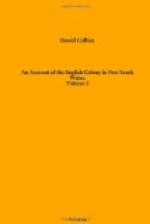The weather in the last month was remarked to be uncommonly cold. In the latter part of this it was excessively sultry, and the wind high, which set many parts of the country on fire, and destroyed some property. The surveyor-general’s house, and every article in it, was consumed by one of these conflagrations.
September.] The Barwell being ready for sea, she dropped down the harbour on the 12th, and sailed the 17th of this month for China. Captain Cameron, her commander, was allowed to receive on board about 50 persons who had completed their period of transportation, and politely offered to touch at Norfolk Island, for the purpose of landing any people whom the governor might have occasion to send thither. In this ship Mr. Robert Campbell, who arrived here in the Hunter from Bengal, took his passage to China. By this gentleman the governor addressed a letter to the governor-general of India, informing his lordship, that having transmitted to the Secretary of State copies of the letters upon the subject of raising recruits in this country for the army in India, which had been received in the year 1796*, by the officers who were sent from Calcutta in the Britannia, it was the opinion of his Majesty’s ministers, that the inconveniences attending such a measure would more than counter-balance the advantages of it, and that permission for that purpose could not therefore be granted.
[* See Vol I Ch. XXXI, viz ’On board of this ship arrived two officers of the Bengal army, Lieutenant Campbell and Mr. Phillips, a surgeon of the military establishment for the purpose of raising two hundred recruits from among those people who had served their respective terms of transportation. They were to be regularly enlisted and attested, and were to receive bounty-money; and a provisional engagement was made with Mr. Raven, to convey them to India, if no other service should offer for his ship.’]
Indeed, had it been adopted, the army in India could not have been much benefited; since, if the recruiting officers were nice as to the point of character, small would be the number of their recruits, and, if not overnice in this particular, small would be the portion of morality that they would introduce.
In order to encourage as far as possible the rearing of swine in the colony, as well as of every other kind of live stock, a circumstance that must not only prove a great benefit to the public, but be also highly to the advantage of those who devoted a part of their time to this useful purpose, and which, from the advanced state of the private farms, might now be done with far less trouble and expense than formerly, the settlers and others were informed, that when any individual should have prepared a number of such animals fit for the public store, they might make the same known to the commissary, who, in order to prevent any unnecessary expense to the feeder, would give immediate notice of the day and place when and where he would receive them. He was also at liberty to enter into an agreement or contract for a certain length of time, and on such conditions as should be agreed, with any person who would engage to furnish the public store either at Sydney, Parramatta, or the Hawkesbury, with any certain quantity at stated periods.




